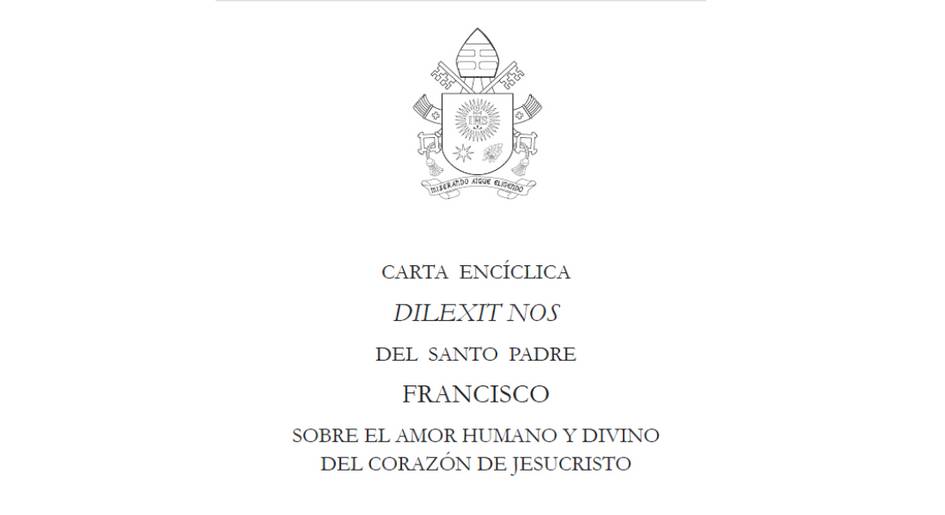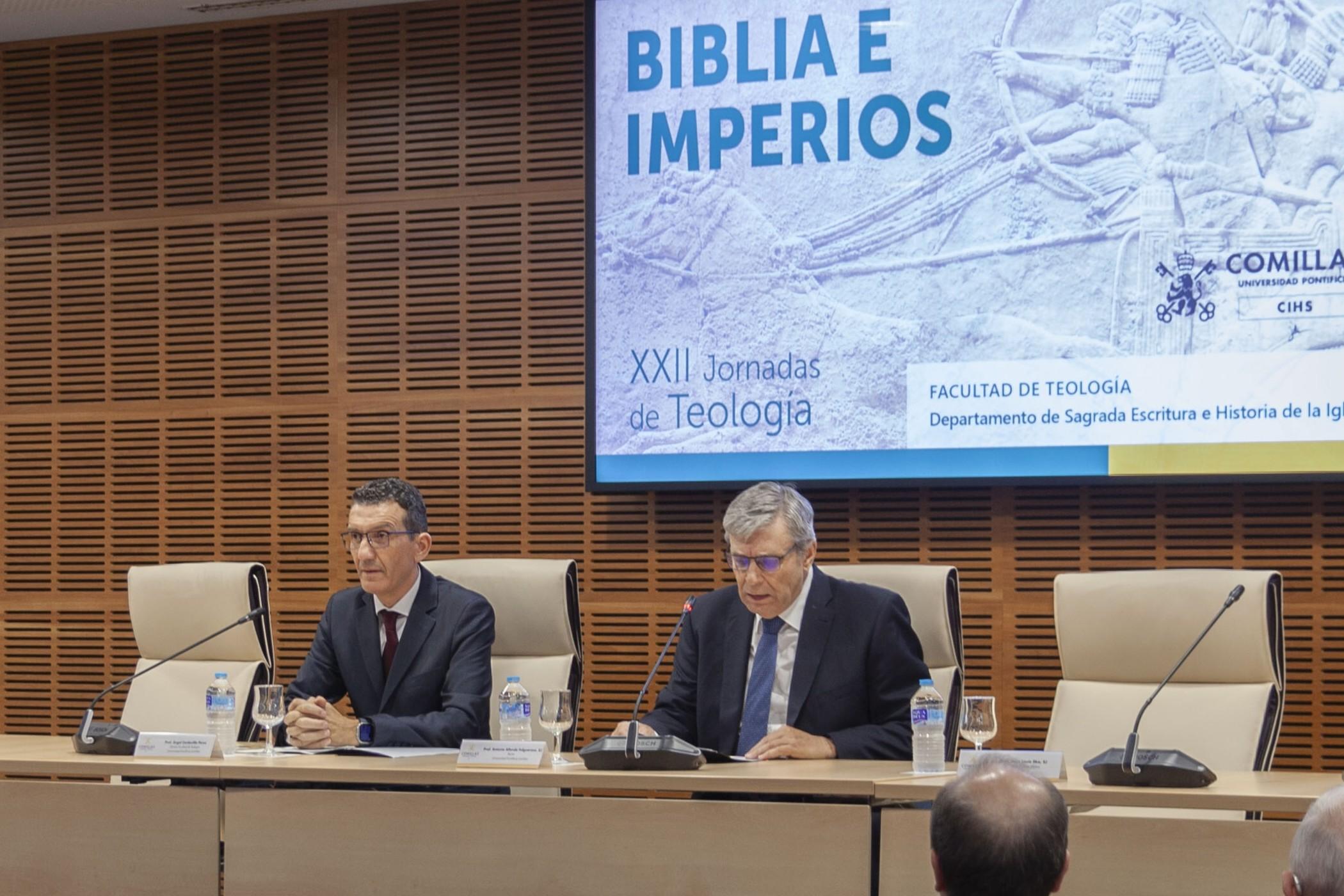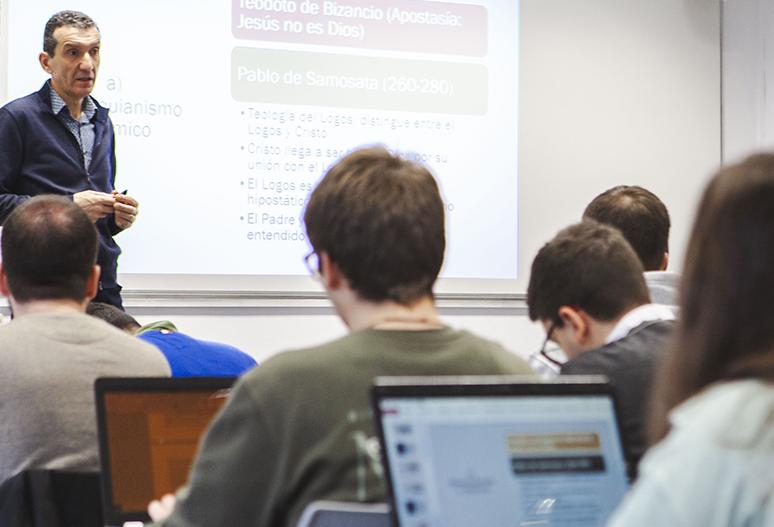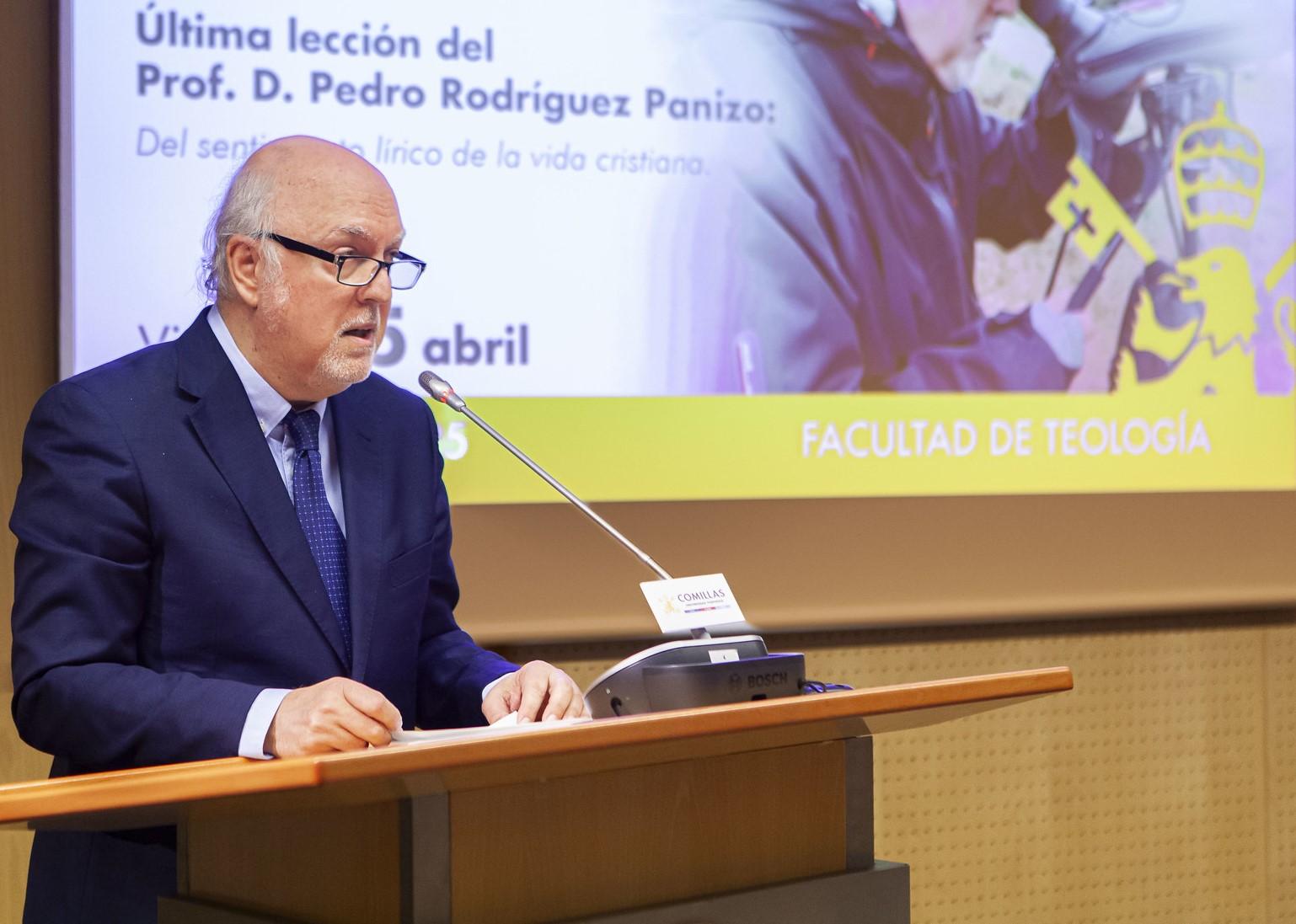Dilexit nos, on the human and divine love of the Heart of Jesus Christ
Professors Nurya Martínez and Gabino Uríbarri comment on the devotion and worship of the Sacred Heart of Jesus, the central theme of Pope Francis' fourth encyclical

The full text is now available
24 October 2024
The IV Encyclical of Pope Francis, entitled Dilexit nos, Encyclical Letter on the human and divine love of the Heart of Jesus Christ, sees the light of day today, Thursday 24 October 2024, in the context of the celebration of the 350th anniversary of the first manifestation of the Sacred Heart of Jesus to Saint Margaret Alacoque.
Nurya Martínez-Gayol, Professor at the Faculty of Theology, comments:
Does an encyclical dedicated to the Heart of Jesus make sense in this historical moment?
I think it does, and very much so.
Despite the fact that, like any move by Pope Francis, it too will unleash critics, defenders and indifferents, and possibly no small number of astonished people.
In the midst of a war (in Ukraine) that seems to have no end, of the crisis in Gaza and in the Middle East, of the expectation of the elections in the United States, of the pressing issue of migration... Many will ask themselves the question: what is the point of an Encyclical dedicated to the Heart of Jesus?
I think it will not take long to find out. As soon as we can delve into its pages. And I suspect that all of us will be a little taken aback. Those who think it is about time the Pope gave importance to this devotion and tradition of the Church, endorsing it; those who are angry that by supporting it he is defending the supporters of the status quo, and of a devotion that has become anachronistic in our day. But it will also unsettle the indifferent, because it is likely to shake our indifference... Not from an unsuspected novelty, but by rescuing the best of our Christian tradition, that which is hidden within a Heart, a pierced Heart, a human-divine Heart, a Heart that is a symbol that draws us into the Mystery.
Pope Francis is in continuity with recent Popes who have been concerned with the question of the Heart of Jesus. In the case of John Paul II's magisterium, his understanding of reparation in the context of the cult of the Heart of Christ stands out as particularly important, something which belongs to the most ancient roots of reparatory spirituality, but which acquires a special value here by identifying the Heart of Christ with the heart of the Church.
"It is still today a matter of guiding the faithful to contemplate with a sense of adoration the mystery of Christ, the Man-God, so that they may become men and women of interior life, people who feel and live the call to new life, to holiness and reparation, which is apostolic cooperation for the salvation of the world; people who prepare themselves for the new evangelisation, recognising that the Heart of Christ is the heart of the Church: it is urgent that the world understand that Christianity is the religion of love"[1].
This approach will also be underlined in his brief letter to the Jesuits (1986) - to entrust once again to the Society of Jesus the renewal in the Church of devotion to the Heart of the Redeemer. Here he makes explicit his understanding of what he calls "the true reparation demanded by the Heart of the Saviour":
"The heart of man must learn from the Heart of Christ to know the true meaning of his life and his destiny, to understand the value of the authentically Christian life, to guard against certain perversions of the heart, and to unite filial love of God with love of neighbour....""In this way - and this is the true reparation demanded by the Heart of the Saviour - the longed-for civilisation of love, the kingdom of the Heart of Christ, can be built on the ruins accumulated by hatred and violence"[2].
Hence the "true reparation" desired by the Saviour is to be found, rather than in pious formulas or arbitrary sacrifices, in solidarity with the redemptive and liberating work of Christ to re-establish the image of God imprinted on the human being and to establish "the civilisation of love".
In the case of Benedict XVI, neither the Heart of Jesus nor reparation have certainly been priority themes in his pontificate. However, his understanding of them is linked to questions that have appeared as nuclear in his thought and in his first encyclicals, such as love, suffering, justice and hope. This is why he takes up the line of his predecessor and in the Encyclical Spe Salvi addresses the question of the Heart.
In my first Encyclical on the theme of love, the starting point was precisely the pierced side of Christ, of which Saint John speaks in his Gospel (cf. Jn 19:37; Deus caritas est, 12). And this centre of faith is also the source of the hope in which we have been saved, a hope which was the subject of my second encyclical. Every person needs to have a "centre" for his or her life, a wellspring of truth and goodness from which to draw in order to face the various situations and the fatigue of daily life. Each one of us, when we remain silent, needs not only to feel the beating of our heart, but also, more deeply, the pulse of a reliable presence, perceptible with the senses of faith and yet much more real: the presence of Christ, the heart of the world. (1 June 2008)
And of reparation with an explicit invitation to study and deepen this theme, aware of the "difficulties" that follow from a certain type of devotion that reparatory spirituality has promoted, and in which - according to the pontiff - "there were undoubtedly exaggerated and perhaps even unhealthy things"[3]. But the difficulties should not be a brake, but rather an incentive to rethink and recover, renewed, the meaning and profound richness of this concept. Benedict XVI therefore extends this invitation to the field of theological reflection:
"Theology should do more to understand even better this reality of reparation. Throughout history there has been no lack of mistaken ideas"[4].
And the Pope goes on, recognising once again the need to deepen the question of reparation and its language. This is another great challenge for theological reflection:
"We do not yet possess sufficient language to understand this fact ourselves and then to make it understood by others".
It does not seem, therefore, that we are dealing with a secondary issue, or with a question that only becomes important because it is linked to the personal devotion of a Pope. We are dealing with a central question of our faith since the pierced Heart of Jesus is the most eloquent symbol of a God who is Love, who reveals himself to us in a human Heart, who desires to enter into dialogue with us: Heart to Heart, who saves us in a Heart pierced on the Cross, and who sends us to "heal the broken and wounded hearts" of our world, to repair it and to return with all that is Created to the Heart of God.
It is the grateful recognition of that love to the extreme, contemplated in the open heart of the Crucified One, that has impassioned men and women throughout history and has thrown them into the gaps of the world and of history, to the point of leaving life in them... to give life. I would therefore like to end with some words of Fr. Arrupe. In the Exercises he made in the year of his appointment as Superior General of the Society of Jesus, he wrote that for him the most significant personal image of Jesus was that of Christ the Repairer. It is perhaps for this reason that the words he bequeathed in his testamentary discourse make even more sense:
"If you wish, as individuals and as a Society, to enter into the treasures of the Kingdom and contribute to building it up with extraordinary effectiveness, do as the poor whom you wish to serve. You often repeat that the poor have taught you more than many books: learn from them this simple lesson: recognise my love in my Heart" (Fr. Arrupe, A last word of advice to the Society: In him alone hope).
[1] John Paul II, Christianity, Religion of Love. Message of John Paul II on the Feast of the Sacred Heart, Warsaw 11 June 1999 on the Centenary of the consecration of the human race to the Sacred Heart by Leo XIII. The underlining is ours.
[2] On 5 October 1986, John Paul II to the then General of the Jesuits, Fr Peter Kolvenbach.
[3] Benedict XVI, Encyclical Spe Salvi, no. 40 (hereafter SS).
[4] Ibid., Allocution to the clergy of Rome (22 February 2007): Ecclesia 3353, (17 March 2007) 31-32.
On the other hand, Professor Gabino Uríbarri, SJ concludes:
Christian life can be described with these very beautiful words of the author of the letter to the Ephesians, in which he gives free rein to the deepest feelings of his apostolic heart:
"Therefore I bow my knees before the Father, from whom every family in heaven and on earth takes its name, that he may grant you, according to the riches of his glory, to be strengthened by the working of his Spirit in the inner man, that Christ may dwell by faith in your hearts, that you, being rooted and grounded in love, may be able to comprehend with all the saints what is the breadth and length and height and depth, and to know the love of Christ which surpasses knowledge, so that you may be filled up to the fullness of God" (Eph 3:14-19).
As can be seen, the text is clearly Trinitarian in nature. It is the pierced heart of Jesus that has allowed and enables us to glimpse and glimpse the breadth and length, the height and depth of God's love and of his own heart. Not only this, but by the action of the Spirit he grants us to be "rooted and grounded", rooted and grounded, to dwell within the loving dynamic of God's heart. In this way, the human heart fully quenches its thirst, becomes divinised, becomes the interpreter and instrument of the love of God's heart, becomes fully christified and, in becoming christified, becomes humanised in all truth, being filled with the fullness of God. Faced with this open heart and his thirst to give us his love, so that we may attain our own fullness, we can only open our own heart and give it to him so that he may dispose it to all his will.
All the latest news from the Faculty of Theology can be found on the website, in the monthly newsletter and on the social network X (formerly Twitter).
You may also be interested in

The Faculty of Theology reflected on power, faith and resistance in biblical traditions, in the framework of the Jubilee of Hope

The Faculty of Theology (Comillas CIHS) is ranked 34th in the world and is the best in the Spanish language, according to the latest ranking by subject

The lecturer of the Faculty of Theology gave his farewell speech, before his imminent retirement, appealing to the lyricism of the Christian life
